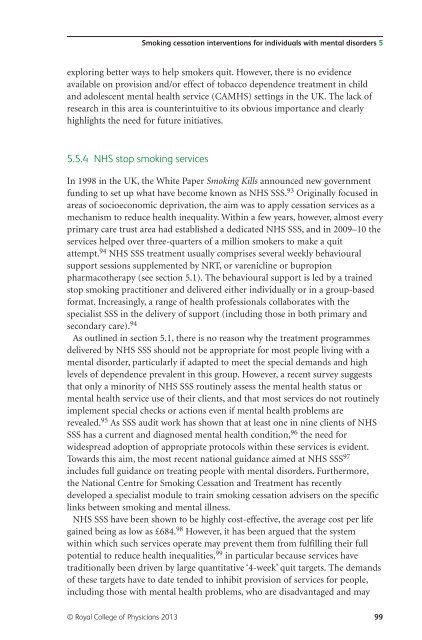Smoking and mental health - NCSCT
Smoking and mental health - NCSCT
Smoking and mental health - NCSCT
Create successful ePaper yourself
Turn your PDF publications into a flip-book with our unique Google optimized e-Paper software.
<strong>Smoking</strong> cessation interventions for individuals with <strong>mental</strong> disorders 5<br />
exploring better ways to help smokers quit. However, there is no evidence<br />
available on provision <strong>and</strong>/or effect of tobacco dependence treatment in child<br />
<strong>and</strong> adolescent <strong>mental</strong> <strong>health</strong> service (CAMHS) settings in the UK. The lack of<br />
research in this area is counterintuitive to its obvious importance <strong>and</strong> clearly<br />
highlights the need for future initiatives.<br />
5.5.4 NHS stop smoking services<br />
In 1998 in the UK, the White Paper <strong>Smoking</strong> Kills announced new government<br />
funding to set up what have become known as NHS SSS. 93 Originally focused in<br />
areas of socioeconomic deprivation, the aim was to apply cessation services as a<br />
mechanism to reduce <strong>health</strong> inequality. Within a few years, however, almost every<br />
primary care trust area had established a dedicated NHS SSS, <strong>and</strong> in 2009–10 the<br />
services helped over three-quarters of a million smokers to make a quit<br />
attempt. 94 NHS SSS treatment usually comprises several weekly behavioural<br />
support sessions supplemented by NRT, or varenicline or bupropion<br />
pharmacotherapy (see section 5.1). The behavioural support is led by a trained<br />
stop smoking practitioner <strong>and</strong> delivered either individually or in a group-based<br />
format. Increasingly, a range of <strong>health</strong> professionals collaborates with the<br />
specialist SSS in the delivery of support (including those in both primary <strong>and</strong><br />
secondary care). 94<br />
As outlined in section 5.1, there is no reason why the treatment programmes<br />
delivered by NHS SSS should not be appropriate for most people living with a<br />
<strong>mental</strong> disorder, particularly if adapted to meet the special dem<strong>and</strong>s <strong>and</strong> high<br />
levels of dependence prevalent in this group. However, a recent survey suggests<br />
that only a minority of NHS SSS routinely assess the <strong>mental</strong> <strong>health</strong> status or<br />
<strong>mental</strong> <strong>health</strong> service use of their clients, <strong>and</strong> that most services do not routinely<br />
implement special checks or actions even if <strong>mental</strong> <strong>health</strong> problems are<br />
revealed. 95 As SSS audit work has shown that at least one in nine clients of NHS<br />
SSS has a current <strong>and</strong> diagnosed <strong>mental</strong> <strong>health</strong> condition, 96 the need for<br />
widespread adoption of appropriate protocols within these services is evident.<br />
Towards this aim, the most recent national guidance aimed at NHS SSS 97<br />
includes full guidance on treating people with <strong>mental</strong> disorders. Furthermore,<br />
the National Centre for <strong>Smoking</strong> Cessation <strong>and</strong> Treatment has recently<br />
developed a specialist module to train smoking cessation advisers on the specific<br />
links between smoking <strong>and</strong> <strong>mental</strong> illness.<br />
NHS SSS have been shown to be highly cost-effective, the average cost per life<br />
gained being as low as £684. 98 However, it has been argued that the system<br />
within which such services operate may prevent them from fulfilling their full<br />
potential to reduce <strong>health</strong> inequalities, 99 in particular because services have<br />
traditionally been driven by large quantitative ‘4-week’ quit targets. The dem<strong>and</strong>s<br />
of these targets have to date tended to inhibit provision of services for people,<br />
including those with <strong>mental</strong> <strong>health</strong> problems, who are disadvantaged <strong>and</strong> may<br />
© Royal College of Physicians 2013 99














